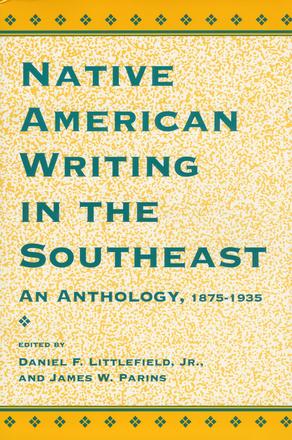
Native American Writing in the Southeast
An Anthology, 1875-1935
The first comprehensive anthology of Native American literature representing tribes of the Southeastern U. S
Description
Featured in this anthology of Native American literature are works by twenty-eight writers from five tribes or nations including Cherokee, Chickasaw, Choctaw, Muscogee (Creek), and Yuchi. Ranging widely in form, from purely aesthetic pieces to editorial letters, all reflect the dramatic changes occurring in Native American life during the so-called Reform Era. It extended from 1875, with the close of the treaty-making period, to 1935, when the United States began to reverse a policy of liquidating tribal domain and assimilating Indians into society at large.
For Indians of the American Southeast, this was the most devastating and destructive policy since removal. Official assault on tribal domain and native identity proved fruitful ground for native writers. As the works collected here clearly show, the literary response to harsh reforms was dynamic.
Included here are these Native American tribes and respective authors: Cherokee: John Lynch Adair, Mabel Washbourne Anderson, David J. Brown, DeWitt Clinton Duncan (Too-qua-stee), Rachel Caroline Eaton, Royal Roger Eubanks, William Eubanks, John Milton Oskison, Will Rogers, Ora V. Eddleman Reed, Rolly Lynn Riggs; Eastern Band Cherokee: Will Trenton Canup; Chickasaw: Charles David Carter, Ben H. Colbert, James Harris Guy; Choctaw: Israel Folsom, Ben D. Locke, David C. McCurtain, Gabe E. Parker, Sr. , Muriel Hazel Wright; Muscogee: Joseph Bruner, Charles Gibson, William McCombs, Jesse J. McDermott, Pleasant Porter, Alexander Lawrence Posey; Yuchi: James Roane Gregory.
Like Native Americans struggling in other regions, those whose traditional homelands were in the American Southeast endeavored to maintain an native identity. In the racially divided South, maintaining autonomy over their tribal lands was a persisting problem. One result of their struggle was intense literary activity. The letters, addresses, short stories, lyric poems, plays, dialect works, and biographical and historical prose they produced reflect dramatic and devastating alteration to their societies as the government programs enforced English education, dissolution of common tribal land titles, and allotment of land to individuals during the era of reform.